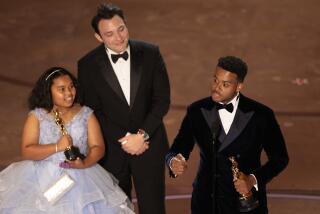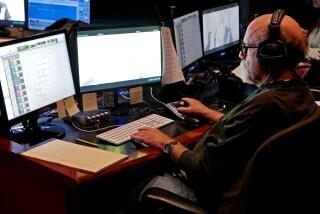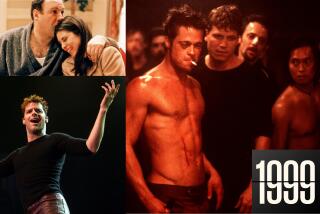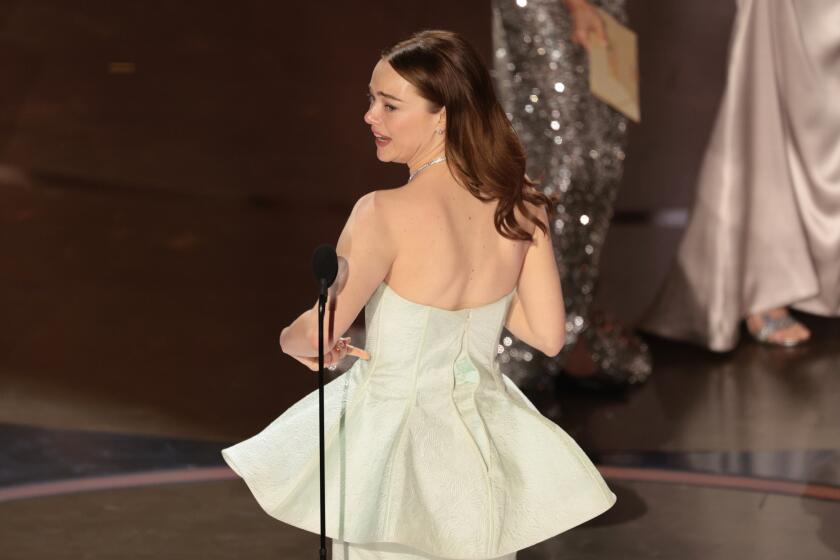How Johnny Mann came to write the KHJ jingle in ‘Once Upon a Time ... in Hollywood’
One of the most familiar melodies — especially to Southern California residents — in Quentin Tarantino’s “Once Upon a Time ... in Hollywood,” which uses vintage pop tunes and period AM radio to help re-create 1969 L.A., was never recorded by a rock group, never sold in record stores and never offered on jukeboxes. Yet it’s been heard on L.A. radio for more than 50 years and is still played daily on the local airwaves.
That melody, six notes in the key of F that comfortably fit the phrase “Ninety-three K-H-J,” first turned up in 1965 when Los Angeles AM station KHJ became “Boss Radio” under soon-to-be-legendary radio programming consultant Bill Drake. The musical jingle not only helped define KHJ’s new sound as it became the dominant L.A. music station, but was also soon used by Drake for other stations around the country. Today the melody, slightly modified, can be heard in the jingle for KRTH-FM.
Created by longtime Hollywood music figure Johnny Mann and sung by a tightly harmonizing group of Hollywood pros known as the Johnny Mann Singers, the melody is heard both at the beginning of “Once Upon a Time ... in Hollywood” when Rick and Cliff are first seen in the Cadillac, car radio tuned to KHJ, and at the very end as the last of the credits roll up.
Film reporters and critics from The Times discuss Quentin Tarantino’s highly personal historical epic “Once Upon a Time ... in Hollywood.”
Tarantino said on the “Today” show that the vintage radio presence — always KHJ in the film — with its signature DJs and vintage ads recalled the radio of his youth and served as a kind of period narrator taking the audience through the movie. He also used the distinctive exterior of KHJ’s former Melrose Avenue offices to stand in for the entrance to Columbia Studios in the film.
In a 2011 interview, Mann, who died in 2014, recalled by phone from his home in Anderson, S.C., how the familiar jingle came about.
“I got a call from a gentleman [Don Otis] at KHJ who was program director and wanted to do some jingles,” Mann said. “I had done one for KFWB — KFWB Channel 98. Apparently, this gentleman heard about that and called me about doing jingles for KHJ. He said, ‘Can we do it right away?’ and I said ‘Well, Don, right now the musicians union is on strike,’ and he said, ‘I’ve just gotta have my jingles, I’ve gotta have something.’ And I said, ‘Would you consider doing them a cappella?’
“And of course right then he said, ‘What’s a cappella?’ I said, ‘A cappella is no accompaniment,’ and he said, ‘That’ll be a little naked, won’t it?’ And I said, ‘No, I think you might like it.’ So that’s when the first [sings] ‘Ninety-three KHJ, Los Angeles’ was born. From there it just went on.”
Mann said writing the jingle was a simple process.
“I just created it. What words are we using? 93 KHJ. OK, I put it in the key I thought it should be in and it’s been in for 50-some years now.”
Jingles were only a portion of Mann’s musical portfolio. He started out in Hollywood orchestrating and arranging movie scores at several studios and had an early TV success on the short-lived “NBC Comedy Hour” in 1956 where he first met the Hollywood professional singers he would use under contract as the Johnny Mann Singers. That group included Thurl Ravenscroft, the original voice of Tony the Tiger and a familiar voice in such Disney attractions as the Haunted Mansion and Pirates of the Caribbean. Ravenscroft would work with Mann for decades.
Mann then went to Liberty Records, where he became the in-house musical conductor and vocal chorus leader.
Mann made a long-running series of easy-listening albums for Liberty with the Johnny Mann Singers and also provided backup for many Liberty artists, including Julie London, Bobby Vee, Gene McDaniels, Eddie Cochran and Johnny Burnette. The Chipmunks were also on Liberty, and though the sped-up voices on the records were done by Ross Bagdasarian (as “David Seville”), Mann did the voice of chipmunk Theodore on the “The Alvin Show” TV series in the early 1960s.
If you were a late-night TV viewer in the “Once Upon a Time ... in Hollywood” era, you could have caught Mann on Joey Bishop’s talk show, which was slotted against Johnny Carson’s “Tonight Show” from 1967 to ’69. Regis Philbin was Bishop’s co-host while Mann led an orchestra of Hollywood studio musicians, introduced by Bishop each night as “Johnny Mann and his Merry Men.”
Johnny Mann has performed as a backup vocalist to Frank Sinatra, Dean Martin, Johnny Mathis, Bing Crosby and Danny Kaye.
Mann later had his own TV variety series, “Stand Up and Cheer” (1971-74).
He continued to record jingles for KRTH and other stations even after moving to South Carolina in 2005, flying back to do the sessions in Hollywood, but later recorded in Nashville with professional singers there.
“I had to find out that I could find the good, professional singers here and I did. I was lucky,” he said.
Tarantino’s film offers a tantalizing look into a past of Top 40 DJs, KHJ’s Boss Radio heyday and 1969 Hollywood. All are long gone, but Johnny Mann’s familiar melody lingers on. A legacy that seems only fitting for a man of music like Johnny Mann.
More to Read
Only good movies
Get the Indie Focus newsletter, Mark Olsen's weekly guide to the world of cinema.
You may occasionally receive promotional content from the Los Angeles Times.






